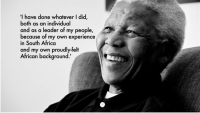What we do
The Nelson Mandela Foundation focuses its work on contributing to the making of just societies by mobilising the legacy of Nelson Mandela, providing public access to information on his life and times, and convening dialogue on critical social issues. The key objective is finding sustainable solutions to the problems confronting humanity. We aim to become a respected change agent in South Africa and beyond, with a global audience and an embedded practice of deep dialogue informed by robust research, analysis and evaluation.
Dialogue and Advocacy
The objective of the Dialogue and Advocacy platform is to find sustainable solutions to critical social issues. Drawing on the rich traditions of transformative dialogue, problem-solving and social renewal that made South Africa’s remarkable transition possible, the Foundation hopes the drive positive change and realise social justice by facilitating engagements about the problems people face.
Memory - the archives of Nelson Mandela
The Nelson Mandela Foundation’s research and archive function aims to generate an integrated and dynamic information resource on the life and times of Nelson Mandela, and to undertake the research and analysis required to support all Nelson Mandela Foundation functions.
Unlike most conventional archives, the Foundation is not defined by the custody of physical collections (although it has substantial and growing collections).
The Mandela Archive is infinite, fragmented and scattered, both geographically and institutionally. It is neither the intention of the Foundation, nor its mandate, to bring all these materials into a single physical collection.
“ The time will come when our nation will honour the memory of all the sons, the daughters, the mothers, the fathers, the youth and the children who, by their thoughts and deeds, gave us the right to assert with pride that we are South Africans, that we are Africans, and that we are citizens of the world. ”
The imperative is to document this vast resource, facilitate access to it, and promote its preservation and use. The most important tool in achieving this objective is web-based technology.
The Foundation has conceptualised a multilayered virtual archive (portal) accessible through its website.
The following key design elements define the portal’s shape – a surface layer of stories and information; databases providing dense description of materials; linkages to actual materials, to other sites and to different layers within the site; digitised materials, from hard copy to moving images; and a social media webbing around it.
The Foundation aims to continue developing the portal, staying abreast of new technologies, and ensuring that the portal becomes the best used and most highly trusted online resource on the life and times of Nelson Mandela.
The Foundation routinely fields several thousand enquiries a year about Mr Mandela, about archival sources, access to materials, and use of Mr Mandela’s intellectual property. The Foundation constitutes a one-stop shop for all such enquiries, whatever their origin.
In addition to routine research on the life and times of Mr Mandela, the Foundation undertakes both continuing robust scoping of the broader social environments in which the organisation operates and a range of special research projects.
The Foundation, through its research and archive work:
- Locates documents and promotes the preservation of these scattered resources
- Collects and curates Mr Mandela’s personal archive
- Promotes public access to these resources
- Facilitates research by individuals and institutions
- Utilises an array of information-delivery platforms to make information available to global and local audiences
Mandela Day
Nelson Mandela followed three rules throughout his life, which he did at great personal sacrifice: Free yourself. Free others. Serve every day. It was not just his mantra; it was his way of life.
The message behind the Nelson Mandela International Day campaign is simple – that each individual has the ability and responsibility to make an impact through public service. It is the activation of our Founder’s ethos and demonstrates that his vision has indeed inspired a global movement for good. The call to action is clear: take action, inspire change and make every day a Mandela Day.
Mandela Day will continue to become an even more vital means of honouring and activating his legacy. It joins government, civil society, industry and the general public in a common purpose.
If the legacy of Nelson Mandela’s life and work is to be dynamic, it must be "owned" by current and future generations; it must be accessible to everyone, and applied in constantly changing contexts of time and place.
The Mandela Day campaign was inaugurated as a vehicle to achieve this. Its objective is to inspire individuals to take action to help change the world for the better, and in doing so, to build a global movement for good. Ultimately, it seeks to empower communities everywhere.
Individuals and organisations are free to participate in making every day a Mandela Day. We do, however, urge them to find inspiration for their contribution in the legacy of Nelson Mandela and to adhere to the ethical framework of "service to one’s fellow humans" every day.
The Nelson Mandela Centre of Memory in Houghton, Johannesburg.
(Image: NMF)